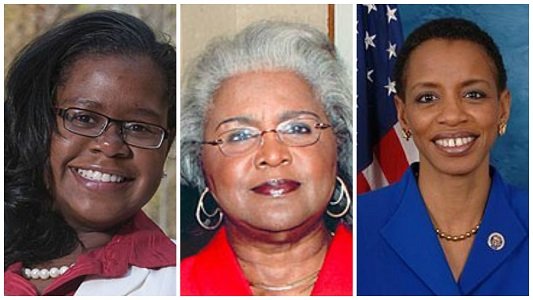Even though working women comprise 50 percent of Maryland’s workforce, data on income disparity shows that the typical man makes more than $58,000 a year, while women make $50,480.
Broken down, statistics further indicate that white women make 86 cents for every dollar their white male counterparts make, African-American women bring home 69 cents and Latino women are paid 40 cents for every dollar a white man makes. The consequences of this inequality and the wealth gap it creates are clear.
In Maryland, middle and working class families in general, and women in particular are in crisis, according to several speakers at the Women’s Economic Security Agenda Community Forum.
For many of these families stuck with stagnant salaries and wages, it’s a constant balancing act trying to make scarce dollars stretch to pay for rent, childcare, clothing, food and other costs which continue to spiral out of control.
By contrast, except for the occasional hiccup, the stock market continues to rack up record gains and mega banks, big business and large corporations are raking in sizeable profits and at the highest echelons of society, economy, life is good.
“Many families are barely scraping by,” said Maryland Delegate Angela M. Angel, who moderated a forum and panel discussion recently. “Ten percent of women live in poverty, while 14 percent of African-American women are in the same situation and 70 percent of the low-wage workforce is women.”
What often escapes people, Angel added, is that significant numbers of women are working but with less than full time hours and the ever spiraling cost-of-living, they can’t make ends meet.
“Sometimes [they’re] just struggling to pay daycare,” Delegate Angel pointed out. “These priorities are essential because working families are a quintessential part of communities in Maryland. It’s not talked about enough— working and lower-class families are often ignored.”
The advocacy of “Maryland Working Families,” an organization committed to reversing this reality is fighting to level the playing field for women and families through legislation and other means.
The group, which hosted the January 9 forum at the Greenbelt Library, has been busy canvassing, knocking on doors all over the state educating individuals and families and marshaling support for three bills that they, advocates and their legislative supporters have been working tirelessly to get passed by the end of the 90-day session which began on January 13, 2016. The bills seek pay equity, fair work scheduling, and paid family leave.
“If you look at the agenda for women in Annapolis, the agenda has been the same over the past five to 10 years and needs to change. Things need to be done,” said Maryland Senator Joanne Benson. “The Maryland Women’s Forum has knocked on doors, worked hard because the family is in crisis. Salaries and wages are stagnant, and employers demand 24 hour availability … which means that working parents are not able to plan for or manage family responsibilities.”
“There’s no planned family leave, more and more women in their families are being encouraged to shoulder greater burden but not share in the bounty. Women are disproportionately impacted by many of the barriers in legislation.”
Since the 2007 recession, millions of workers have been unemployed or have been forced to take part-time jobs when they’d prefer to be working fulltime. The toll on workers has been significant, including small paychecks, instability, long hours, lack of sleep and the inability to take care of themselves and their families.
Often, employees work 12-hour shifts or more; face intense competition for scarce jobs; usually have to give six months notice for availability and time off; and must be available for more than 100 hours in order to get 32 hours of work.
Early Learning Educator Alethia McCaskill shared with the audience at the Greenbelt Library of coming out of a “poverty-infested” community in Baltimore County; graduating from college despite being told she would never succeed; giving birth to a beautiful child and working at a prestigious private sector organization— Johns Hopkins Medical Center— but being so pressed with the responsibilities of her job, that her dream job filled her with doubt.
The job was demanding and McCaskill said she was pregnant and had medical complications during her second and third trimesters.
“I had a pager which meant responsibilities. I decided to go to my supervisor and told her about my medical problems. She promised to accommodate me— but gave me a footstool.”
And although her doctor instructed her to go on immediate bed rest, McCaskill would cart 300-400 page reports across campus and stand on her feet giving lectures.
She then decided to make a career change and opened Tiny Tots. Many at Hopkins told me I’d fail, but I had missed the school plays, concerts and developmental milestones of my two children. Twenty years later, parents are dealing with the same issues.”
“Tiny Tots serves doctors, fast food workers, janitors, retail workers who struggle with wages and budget. There’s no schedule, not being able to take time off, no parental leave— 20 years later, this is still going on. We haven’t been able to turn to the page to “the end.” There’s no end to unfair wages and all the other things related.”
Keynote Speaker Maryland Congresswoman Donna Edwards echoed Benson, asserting the need to broaden the space in which women operate.
“I understand these issues because I am a woman,” said Edwards, who is campaigning to fill retiring Senator Barbara Mikulski’s U.S. Senate seat. “When I hear about the numbers, the only thing I can think of it that it’s not a buck. Seventy lousy cents on the dollar and 40 pathetic cents tells me that families and communities aren’t getting what they need to sustain themselves.”
“They’re trying to balance electricity, gas, the water bills, rent and mortgage. Frankly, it’s up to policymakers to do the right thing locally and nationally.”
